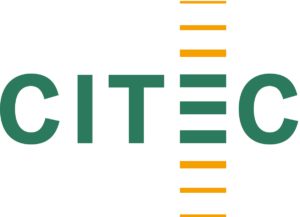The PsyCurio APp
What’s inside?
Acrophobia Module
This module is designed to give patients with acrophobia the opportunity to gradually get used to heights without having to leave the treatment room. For this purpose, a ride in a glass elevator to the top floor of a tall building is simulated. Patients who are ready to take the next step can afterwards climb down the outside of the virtual building.
Social Anxiety Module Series
Our social phobia module series offers the opportunity for patients to practice being in the spotlight by speaking in front of people in four different immersive environments: classroom, seminar, conference, and lecture hall.
We also have three social skills training exercises in the subway, a supermarket and a bar.
Claustrophobia Module
Our claustrophobia module makes it possible to safely introduce patients to the experience of being in enclosed spaces. It simulates a scenario in which patients are in a virtual elevator that gets stuck, supplemented by a virtual emergency procedure to ensure a controlled and safe exposure.
Arachnophobia Module
This module offers a virtual encounter with a spider, allowing patients to safely confront and manage their arachnophobia. Through direct interaction, including the option to ‘hold’ the spider without risk, patients can gradually reduce their fear and develop effective coping strategies.
Containment Exercise
This module, specifically designed to assist the treatment of trauma and PTSD, is our in-virtuo adaptation of the proven in-sensu containment exercise. It eliminates the need for imaginary efforts and supports the development of effective coping strategies.
Mini Games
As motivation is one of the key factors for successful therapy, we have recently integrated mini-games into our module catalog. Our immersive 3D games activate the brain and body and improve key cognitive functions such as decision-making, reaction speed, and memory in an entertaining and engaging way.
Acrophobia Module
This module is designed to give patients with acrophobia the opportunity to gradually get used to heights without having to leave the treatment room. For this purpose, a ride in a glass elevator to the top floor of a tall building is simulated. Patients who are ready to take the next step can afterwards climb down the outside of the virtual building.
Social Anxiety Modules
Our social phobia module series offers the opportunity for patients to practice being in the spotlight by speaking in front of people in four different immersive environments: classroom, seminar, conference, and lecture hall.
We also have three social skills training exercises in the subway, a supermarket and a bar.
Claustrophobia Module
Our claustrophobia module makes it possible to safely introduce patients to the experience of being in enclosed spaces. It simulates a scenario in which patients are in a virtual elevator that gets stuck, supplemented by a virtual emergency procedure to ensure a controlled and safe exposure.
Arachnophobia Module
This module offers a virtual encounter with a spider, allowing patients to safely confront and manage their arachnophobia. Through direct interaction, including the option to ‘hold’ the spider without risk, patients can gradually reduce their fear and develop effective coping strategies.
Containment Exercise
This module, specifically designed to assist the treatment of trauma and PTSD, is our in-virtuo adaptation of the proven in-sensu containment exercise. It eliminates the need for imaginary efforts and supports the development of effective coping strategies.
Mini Games
As motivation is one of the key factors for successful therapy, we have recently integrated mini-games into our module catalog. Our immersive 3D games activate the brain and body and improve key cognitive functions such as decision-making, reaction speed, and memory in an entertaining and engaging way.
But wait, there is more…
Want to see our other modules?
Contact us for a free demonstration of our entire product!
Our Partnerships
PsyCurio For Science
Do you want to use VR-Therapy for your Research Project?
PsyCurio
The Future of Psychotherapy
More Questions?
Ready to get Started?
















